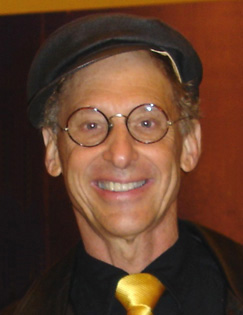Allan Snyder facts for kids
Quick facts for kids
Allan Whitenack Snyder
|
|
|---|---|
 |
|
| Born | 1942 (age 82–83) |
| Alma mater | University of London (DSc), University College London (PhD), Harvard (MS), Massachusetts Institute of Technology (SM), Pennsylvania State University (BS), Central High School Philadelphia (BA) |
| Awards | 1996 Harrie Massey Medal of the British Institutes of Physics, 1997 International Australia Prize, 2001 Marconi Prize, 2001 Clifford Paterson Prize, Royal Society |
| Scientific career | |
| Fields | Mind Sciences, Visual Neurobiology, Communications and Optical Physics |
| Institutions | Director, Centre for the Mind, University of Sydney |
Allan Whitenack Snyder (born 1942) is a famous scientist and director of the Centre for the Mind at the University of Sydney in Australia. He holds a special position there as the 150th Anniversary Chair of Science and the Mind. Snyder also helped start a company called Emotiv Systems. He has won important awards like the International Australia Prize in 1997 and the Marconi Prize in 2001 for his work in optical physics.
Dr. Snyder is also the person who created and leads the What Makes a Champion? forum. This event was part of the Sydney 2000 Olympic Games. He also helps guide research for MindChamps World, focusing on how our brains work.
Snyder first started his research in optical physics, which is about light. More recently, he has focused on how the mind works. He has even shown on TV how special brain stimulation can help people gain skills similar to those seen in savants.
Contents
Understanding Savant Skills
Allan Snyder is very interested in understanding people called savants. Savants are individuals who have amazing abilities, often in areas like math, memory, or art. Snyder believes that in savants, the usual way our brains think—like making logical decisions—is somehow turned down.
His idea is that when this "top layer" of thinking is less active, it allows the brain to access very tiny details or perform super-fast calculations. He hopes that one day, scientists might create technology. This technology could help anyone access these special abilities, not just savants.
Awards and Recognition
Allan Snyder has received many important awards for his work. In 1996, he won the Harrie Massey Medal and Prize. He also received the prestigious Marconi Prize in New York City in December 2001.
He became a Fellow of the Royal Society of London in 1990. This is a very high honor for scientists. The Royal Society also gave him their 2001 Clifford Paterson Prize.
Before these honors, he was a Guggenheim Fellow at Yale University’s School of Medicine. He was also a Royal Society Research Fellow at Cambridge University.
His Education
Allan Snyder has studied at many top universities. He earned a DSc from the University of London. He also received his PhD from University College, London, in 1969. He has an MS from Harvard University (1967) and an SM from Massachusetts Institute of Technology (1965). His first degree was a BS in Electrical Engineering from Pennsylvania State University (1963).
The Centre for the Mind
The Centre for the Mind was Allan Snyder's idea. It officially started at the Museum of Sydney on August 4, 1997. A famous writer, Oliver Sacks, gave the first big public talk about "Creativity and the Mind" the next day.
The first people on the Centre for the Mind's board included:
- Allan Snyder
- Gavin Brown
- Peter Karmel
- Lachlan Murdoch
- Baz Luhrmann
Some notable people who received special medals from the Centre include:
- Daniel Dennett
- Horace Barlow
- Vilayanur Ramachandran
- Richard Branson
What the Centre Does
The Centre for the Mind aims to understand what makes humans unique. They do this by supporting challenging research. They also organize exciting intellectual events and connect great thinkers from around the world. Their labs focus on scientific ways to improve creativity and help people develop a "champion mindset."

